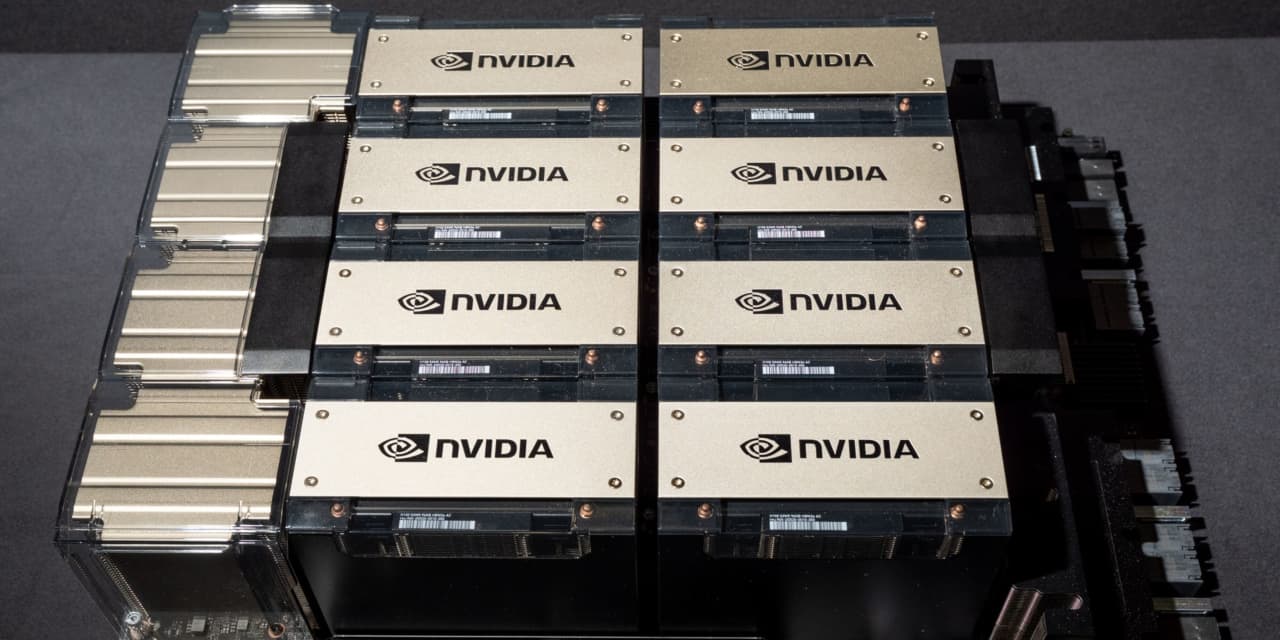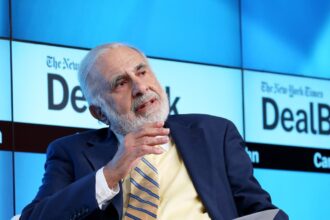An Nvidia server. Big Tech shares have surged on strong earnings.
Marlena Sloss/Bloomberg
Big Tech has been the main driver of this year’s rally, and some of these stocks have shown their mettle by continuing to outperform during the market’s recent rough patch.
If earnings estimates are right, they deserve those gains.
On Wednesday, DataTrek co-founder Jessica Rabe took a look at the so-called Magnificent Seven big tech firms—
Apple
(ticker: AAPL),
Amazon.com
(AMZN), Google parent
Alphabet
(GOOGL),
Facebook
parent
Meta Platforms
(META),
Microsoft
(MSFT),
Nvidia
(NVDA), and
Tesla
(TSLA). These collectively account for nearly 28% of total market capitalization of the
S&P 500,
ranging from 7% for Apple alone, to 1.8% for Meta.
Little wonder then that their rise has carried the index higher, too. Yet for all the concern that artificial-intelligence enthusiasm has gotten ahead of itself, Rabe argues that there are fundamental reasons backing the tech boom: Just look at profits.
Looking at consensus estimates for the group shows that every company except Tesla has seen analysts lift earnings estimates for the current third quarter, the current year, and 2024. Moreover, Amazon, Meta, and Nvidia have seen earnings estimates jump by double-digit percentages.
That’s a marked contrast from the 0.4% downward revision for the S&P 500’s overall earnings this quarter, and 0.5% upward revision for the index next year. In fact out of the Magnificent Seven only Tesla, with downward earnings revisions across the board, has a worse outlook than the S&P 500.
Those increasingly optimistic expectations help to explain why Alphabet, Amazon, Meta, and Nvidia shares have all outperformed the S&P 500’s 0.8% rise over the past three months, Rabe highlights. The fact that Apple and Microsoft lagged could reflect the fact that while analysts are confident about the third quarter, 2023, and 2024, they lowered their fourth-quarter earnings-per-share estimates for those two companies, clouding the profit picture.
Of course, that rationale is dinged a bit by the fact that Tesla stock is up 2.3% over the past three months even as analysts have lowered their bottom-line estimates for the company.
However Rabe notes that her firm believes “the company is more of a call option on the disruptive innovation of autonomous vehicles than a straightforward equity to be valued only by discounting future cash flows. Tesla’s profitability is therefore not as important as it is for the company to keep its strong market share in electric vehicles and make it to the personal transportation/AV ‘finish line.’”
Ultimately, investors may be happy to hear that companies are cutting costs—such as the layoffs announced Monday at
Cisco Systems
(CSCO)—and continuing to innovate in the AI space, but it’s the bottom line that truly matters, and has been powering the Magnificent Seven forward.
In fact, tech as a whole rapidly recovered from their brief August stumble, and the
Nasdaq Composite’s
more than 30% year-to-date gain is roughly double the S&P 500’s gain. Technical patterns in the past suggest that this can continue, as quick reversals in sentiment about the industry often precede big bull runs, as SentimenTrader noted at the start of the month.
The upshot is that the momentum in tech certainly remains, and while third-quarter earnings season will once again likely be a test of that, Big Tech’s winners have cleared that bar in the past, and appear poised to do so again.
So much the better for the market as a whole.
Write to Teresa Rivas at [email protected]
Read the full article here










